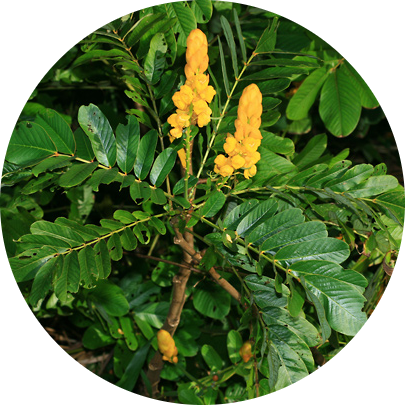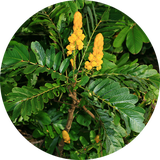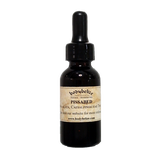- PLANT MEDICINE
- >
- Tinctures
- >
- PISSABED TINCTURE
PISSABED TINCTURE
Family: Fabaceae
Genus: Senna
Species: Senna alata
Synonyms: Cassia alata, Herpetica alata
Common Names: Pissabed, Candle Bush, Emperor's Candlesticks, Candlestick Senna
Parts Used: Leaves, seeds
Main Actions: Laxative, antimicrobial, anti-inflammatory
Other Actions: Antifungal, antiparasitic, analgesic
Description: Senna alata is a perennial shrub with bright yellow flowers, known for its large leaves and upright growth habit. It typically reaches heights of 2 to 4 meters.
Tribal and Herbal Medicine Uses: Used in traditional medicine to treat skin conditions, fungal infections, intestinal parasites, and as a purgative.
Plant Chemicals: Anthraquinones (such as chrysophanic acid, rhein, and aloe-emodin), flavonoids, tannins, saponins.
Biological Activities and Clinical Research: Studies have shown Senna alata's efficacy against various pathogens including bacteria, fungi, and parasites. Its anthraquinone content is responsible for its laxative effects.
Current Practical Uses: Primarily used in herbal medicine for its laxative properties and in the treatment of skin conditions.
Main Preparation Method: Decoction, poultice, infusion.
Main Actions (in order): Laxative, antimicrobial, anti-inflammatory
Main Uses: Constipation relief, treatment of skin infections and wounds
Properties/Actions Documented by Research: Laxative, antimicrobial, anti-inflammatory, laxative, antibacterial, anti-tumor, diuretic, pain relieving, hypoglycemic (lowering blood sugar)
Other Properties/Actions Documented by Traditional Use: Antifungal, antiparasitic, analgesic
Cautions: Prolonged use may lead to dependence. Overdose can result in severe diarrhea and electrolyte imbalance. Not recommended for use during pregnancy and lactation.
Traditional Preparation: Leaves are often prepared as decoctions for internal use or used topically as poultices for skin conditions.
Contraindications: Individuals with intestinal obstruction, appendicitis, inflammatory bowel disease, or abdominal pain should avoid its use. Not suitable for children under 12 without medical supervision.
Drug Interactions: May interact with medications that affect electrolyte balance or intestinal motility. Consultation with a healthcare professional is advised before use, especially if taking other medications.
DO NOT take for more than 7 consecutive days.
Recommended dosage: 1-2ml taken in a small glass of water or juice 2 x daily on an empty stomach for better absorption for no more than 7 consecutive days.



